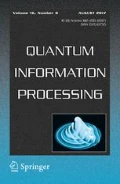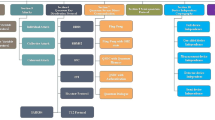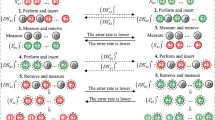Abstract
Recently, multiparty entanglement is becoming an important physical resource to design some typical quantum cryptography protocols. In this paper, we firstly proposed two special QSS protocols with the multiparty entangled states \(|\chi _{n}\rangle \) and \(|S_{n}\rangle \). Then, their security has been proved to resist existing attacks. Furthermore, a new QSS model has been summarized by analyzing the property of the used multiparty entangled states. Moreover, compared with some other QSS protocols based on multiparty entangled states, it can be seen that our protocol is efficient in quantum communication and computation.

Similar content being viewed by others
References
Bennett, C., Brassard, G.: Quantum cryptography: public key distribution and coin tossing. In: Proceedings of IEEE International Conference on Computers, Systems, and Signal Processing, pp. 175–179. IEEE Press, New York (1984)
Ekert, A.: Quantum cryptography based on Bell theorem. Phys. Rev. Lett. 67, 661 (1991)
Bennett, C.: Quantum cryptography using any two nonorthogonal states. Phys. Rev. Lett. 68, 3121 (1992)
Bennett, C., Brassard, G., Crepeau, C., Jozsa, R., Peres, A., Wootters, W.: Teleporting an unknown quantum state via dual classical and Einstein–Podolsky–Rosen channels. Phys. Rev. Lett. 70, 1895 (1993)
Gao, F., Guo, F.-Z., Wen, Q.-Y., Zhu, F.-C.: Quantum key distribution without alternative measurements and rotations. Phys. Lett. A 349, 53 (2006)
Bostrom, K., Felbinger, T.: Deterministic secure direct communication using entanglement. Phys. Rev. Lett. 89, 187902 (2002)
Deng, F.-G., Long, G.-L.: Secure direct communication with a quantum one-time pad. Phys. Rev. A 69, 052319 (2004)
Deng, F.-G., Long, G.-L.: Reply to “Comment on ‘Secure direct communication with a quantum one-time-pad”’. Phys. Rev. A 72, 016302 (2005)
Lin, S., Wen, Q.-Y., Zhu, F.-C.: Quantum secure direct communication with \(\chi \)-type entangled states. Phys. Rev. A 78, 064304 (2008)
Jakobi, M., Simon, C., Gisin, N., et al.: Practical private database queries based on a quantum-key-distribution protocol. Phys. Rev. A 83, 022301 (2011)
Gao, F., Liu, B., Huang, W., Wen, Q.-Y.: Postprocessing of the oblivious key in quantum private query. IEEE. J. Sel. Top. Quant. 21, 6600111 (2015)
Wei, C.-Y., Wang, T.-Y., Gao, F.: Practical quantum private query with better performance in resisting joint-measurement attack. Phys. Rev. A 93, 042318 (2016)
Wei, C.-Y., Cai, X.-Q., Liu, B., et al.: A generic construction of quantum-oblivious-key-transfer-based private query with ideal database security and zero failure. IEEE Trans. Comput. 67, 2–8 (2018)
Liu, B., Gao, F., Huang, W.: QKD-based quantum private query without a failure probability. Sci. China Phys. Mech. Astron. 58, 100301 (2015)
Gao, F., Liu, B., Wen, Q.-Y., Chen, H.: Flexible quantum private queries based on quantum key distribution. Opt. Express 20, 17411 (2012)
Wei, C.Y., Gao, F., Wen, Q.-Y., Wang, T.-Y.: Practical quantum private query of blocks based on unbalanced-state Bennett-Brassard-1984 quantum-key-distribution protocol. Sci. Rep. 4, 7537 (2014)
Zhang, J.-L., Guo, F.-Z., Gao, F., et al.: Private database queries based on counterfactual quantum key distribution. Phys. Rev. A 88, 022334 (2013)
Zeng, G.-H., Keitel, C.-H.: Arbitrated quantum-signature scheme. Phys. Rev. A 65, 042312 (2002)
Li, Q., Chan, W.-H., Long, D.-Y.: Arbitrated quantum signature scheme using Bell states. Phys. Rev. A 79, 054307 (2009)
Zou, X.-F., Qiu, D.-W.: Security analysis and improvements of arbitrated quantum signature schemes. Phys. Rev. A 82, 042325 (2010)
Gao, F., Qin, S.-J., Guo, F.-Z., Wen, Q.-Y.: Cryptanalysis of the arbitrated quantum signature protocols. Phys. Rev. A 84, 022344 (2011)
Zhang, K.-J., Zhang, W.-W., Li, D.: Improving the security of arbitrated quantum signatureagainst the forgery attack. Quant. Inf. Proc. 12, 2655–2669 (2013)
Zhang, K.-J., Qin, S.-J., Sun, Y., Song, T.-T., Su, Q.: Reexamination of arbitrated quantum signature: the impossible and the possible. Quant. Inf. Proc. 12, 3127–3141 (2013)
Hillery, M., Buzek, V., Berthiaume, A.: Quantum secret sharing. Phys. Rev. A 59, 1829 (1999)
Cleve, R., Gottesman, D., Lo, H.-K.: How to share a quantum secret. Phys. Rev. Lett. 83, 648 (1999)
Xiao, L., Long, G.-L., Deng, F.-G., Pan, J.-W.: Efficient multiparty quantum-secret-sharing schemes. Phys. Rev. A 69, 052307 (2004)
Kunar Singh, S., Srikanth, R.: Generalized quantum secret sharing. Phys. Rev. A 71, 012328 (2005)
Li, Y., Zhang, K., Peng, K.: Multiparty secret sharing of quantum information based on entanglement swapping. Phys. Lett. A 324(5–6), 420–424 (2004)
Wang, T.-Y., Wen, Q.-Y., Gao, F., Lin, S., Zhu, F.-C.: Cryptanalysis and improvement of multiparty quantum secret sharing schemes. Phys. Lett. A 373, 65 (2008)
Guo, G.-P., Guo, G.-C.: Quantum secret sharing without entanglement. Phys. Lett. A 310(4), 247–251 (2003)
Zhang, Z.-J., Li, Y., Man, Z.-X.: Multiparty quantum secret sharing. Phys. Lett. A 71, 044301 (2005)
Deng, F.-G., Li, X.-H., Zhou, H.-Y., Zhang, Z.-J.: Improving the security of multiparty quantum secret sharing against Trojan horse attack. Phys. Lett. A 72, 044302 (2005)
Deng, F.-G., Li, X.-H., Zhou, H.-Y., Zhang, Z.-J.: Erratum: Improving the security of multiparty quantum secret sharing against Trojan horse attack. Phys. Lett. A 73, 049901 (2006)
Qin, S.-J., Gao, F., Wen, Q.-Y., Zhu, F.-C.: Improving the security of multiparty quantum secret sharing against an attack with a fake signal. Phys. Lett. A 357, 101 (2006)
Han, L.-F., Liu, Y.-M., Liu, J., Zhang, Z.J.: Multiparty quantum secret sharing of secure direct communication using single photons. Opt. Commun. 281, 2690 (2008)
Wang, T.-Y., Wen, Q.-Y.: Security of a kind of quantum secret sharing with single photons. Quantum Inf. Comput. 11, 434 (2011)
Hsieh, C.R., Tasi, C.W., Hwang, T.: Quantum secret sharing using GHZ-like state. Commun. Theor. Phys. 54, 1019–1022 (2010)
Dehkordi, M.H., Fattahi, E.: A novel and efficient multiparty quantum secret sharing scheme using entangled states. Sci. China phy. Mech. Astron. 55, 1828–1831 (2012)
Rahaman, R., Parker, M.G.: Quantum scheme for secret sharing based on local distinguishabality. Phys. Rev. A 91, 022330 (2015)
Yang, Y.H., et al.: Quantum secret sharing via local operations and classical communication. Sci. Rep. 5, 16967 (2015)
Wang, J.-T., Li, L.-X., Peng, H.-P., Yang, Y.-X.: Quantum-secret-sharing based on local distinguishability of orthogonal multiqudit entangled states. Phys. Rev. A 95, 022330 (2017)
Chen, X.-B., Dou, Z., Xu, G., He, X.-Y., Yang, Y.-X.: A kind of universal quantum secret sharing protocol. Sci. Rep. 7, 39845 (2017)
Wang, Q.-L., Yu, C.-H., Gao, F., Qi, H.-Y., Wen, Q.-Y.: Self-tallying quantum anonymous voting. Phys. Rev. A 94, 022333 (2016)
Ye, T.-Y., Ji, Z.-X.: Two-party quantum private comparison with five-qubit enyangled states. Int. J. Theor. Phys. 56, 1517–1529 (2017)
Gao, F., Guo, F.-Z., Wen, Q.-Y., Zhu, F.-C.: Comment on “Experimental demonstration of a quantum protocol for byzantine agreement and liar detection”. Phys. Rev. Lett. 101, 208901 (2008)
Zhang, Y.-S., Li, C.-F., Guo, G.-C.: Comment on “Quantum key distribution without alternative measurements”. Phys. Rev. A 63, 036301 (2001)
W’ojcik, A.: Eavesdropping on the ping-pong quantum communication protocol. Phys. Rev. Lett. 90, 157901 (2003)
Huang, W., Wen, Q.-Y., Liu, B., Su, Q., Qin, S.-J., Gao, F.: Quantum anonymous ranking. Phys. Rev. A 89, 032325 (2014)
Cabello, A.: N-particle N-level singlet states: some properties and applications. Phys. Rev. Lett. 89, 100402 (2002)
Qin, H., Tso, R.: Efficient quantum secret sharing based on special multi-dimensional GHZ state. Opt. Quant. Electron. 50, 167 (2018)
Yu, K.-F., Gu, J., Hwang, T., Gope, P.: Multi-party semi-quantum key distribution-convertible multi-party semi-quantum secret sharing. Quant. Inf. Proc. 16, 194 (2017)
Yang, W., Huang, L., Shi, R., et al.: Secret sharing based on quantum Fourier transform. Quant. Inf. Proc. 12, 2465–2474 (2013)
Acknowledgements
This work is supported by National Natural Science Foundation of China under Grant No. 61802118, Natural Science Foundation of Heilongjiang Province under Grant No.A2016007, Open Foundation of State key Laboratory of Networking and Switching Technology (BUPT) under Grant No. SKLNST-2018-1-07, University Nursing Program for Young Scholars with Creative Talents in Heilongjiang Province supported under Grant No.UNPYSCT-2018015, Heilongjiang University Innovation Fund for Graduates under Grant No.YJSCX2018-159HLJU and Hei Long Jiang Postdoctoral Foundation under Grant No.LBH-Z17048.
Author information
Authors and Affiliations
Corresponding author
Additional information
Publisher's Note
Springer Nature remains neutral with regard to jurisdictional claims in published maps and institutional affiliations.
Rights and permissions
About this article
Cite this article
Zhang, Kj., Zhang, X., Jia, Hy. et al. A new n-party quantum secret sharing model based on multiparty entangled states. Quantum Inf Process 18, 81 (2019). https://doi.org/10.1007/s11128-019-2201-1
Received:
Accepted:
Published:
DOI: https://doi.org/10.1007/s11128-019-2201-1




